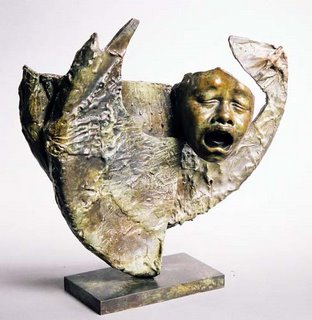
Last Thursday, as news was breaking about the latest foiled terrorist plot, I was sitting at home planning Sunday's worship service. It was difficult to do because I had no idea what the world would be like come Sunday. The news accounts made it sound as if a terrorist attack was still imminent. Anxieties were increasing again around the world and in this country particularly.
I also didn't know how people in our congregation would be feeling. In some ways, the foiled plot was something to celebrate. Untold thousands of lives were saved as a result of the investigative work by British intelligence. On the other hand, it was sobering to know how close we were to another catastrophe that would rival and surpass the events of September 11. As we are approaching the five-year anniversary of that horrific day, it sounds like there were some malicious people who were planning on marking the event by causing more carnage. This is so utterly heartbreaking, when we really let it sink in, that I can hardly bear it.
It turned out that we were hosting a guest preacher on Sunday who is somewhat of an expert on the Middle East, particularly between Israel and the Palestinians. So the subject of worship that day was already heavy. In some ways, it suited the events of the week.
So for this week, I planned a service that embraced lament as one faithful response to the pain and suffering in our world. I found a lament on the World Council of Churches website (from a worship service designed to launch their Decade to Overcome Violence) and I modified it slightly. The lament alternated between a musical piece and spoken word. A young woman from our congregation played a Scottish aria on a violin for the musical lament. It was heartwrenchingly beautiful. For the spoken word parts, I had three different people read their pieces while seated in the congregation. I told them when we rehearsed it that I wanted the voices to come from the congregation--not spoken by leaders toward the gathered people, but spoken to God from amidst the people. The lament concluded with the congregation also speaking words of lament.
I truly believe that gathering in worship together is one of the most faithful responses we can have to events such as we faced last week. Opening ourselves to the healing presence of God at the times of our greatest vulnerability can truly transform this world. God longs for our reconciliation, for a whole cosmos, for the end of strife and terror and abuse.
It was an eye-opener for me a year or two ago when I read this simple sentence in the Book of Common Worship: "We pray for the world because God loves it." It goes on to say:
God created the world and cares for it. God sent Jesus, who died for it. God is working to lead the world toward the future God has for it. To abide in God's love is to share God's concern for the world. Our prayers should therefore be as wide as God's love and as specific as God's tender compassion for the least ones among us.This is a beautiful theology. We pray for the world because God loves it. We don't pray for the world because it is hopeless, a lost cause, beyond redemption. We pray because God so deeply loves the world, because our concerns become God's concerns.
It is at such a time as this, when we face the bleakest realities of life, that worship truly becomes three dimensional. It stands out in relief as a truly faithful, hopeful, prophetic response to desperate, hateful, and threatening times.
Sculpture "Broken Earth" by Roberta Shefrin.
3 comments:
I guess all that talk in Schillebeeckx about worship being an "anticipatory sign" of liberation that is to come is not as far-fetched as I might have thought upon reading it. Seems to me that the eschatological nature of worship needs somehow to be balanced with the lament, and vice-versa. Our hope can't be affirmed without true and honest consideration of our lament. And our lament becomes wallowing without an anchor in the hope of God's love for the world. It brings me back again to thinking of worship and Christian life as yearning - for relief of the brokenness we have the privilege to acknowledge in worship and for the possbiliites in the vision of what could (and will) be to become real and present. Worship as yearning... I feel a book coming on :-)
Amen.
Thanks so much for this. So right.
Also, can you email me? A couple of weeks ago you expressed interest in the virtual retreat idea. It's coming together and I'd like to get your feedback.
rev dot brownell at gmail dot com
Post a Comment